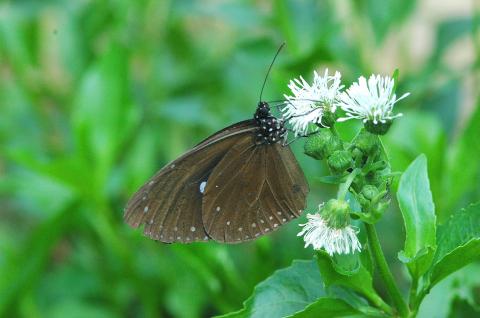Yunlin County’s Linnei Township (林內) is currently holding a festival to celebrate the migration of Taiwanese milkweed butterflies.
The nation’s four species of milkweed butterflies (Euploea) migrate northward from southern Taiwan during March or April every year and are usually blackish brown in color with metallic purple scales and white spots on their wings.
The insects spend the winter in the valleys of southern Taiwan, mostly in Greater Kaohsiung’s Maolin District (茂林) and Taitung County’s Dawu Township (大武).

Photo: Chan Shih-hung, Taipei Times
During migration the butterflies pass through Linnei township in early April, the office said, adding that the butterflies have arrived earlier this year due to a relatively warm winter.
Volunteers counted more than 200 butterflies per minute flying through the town during peak times, the office said.
Researchers have found that a section of the Formosa Freeway (National Freeway No. 3), between kilometer markers 251 and 253, is a hotspot where milkweed butterflies pass through in large numbers during migrating season, so the National Freeway Bureau has set up a protection net to prevent them from being run over. It has since 2007 even closed the freeway’s northbound outside lanes during peak days of the migration.
Following an opening ceremony yesterday, Yunlin County Commissioner Su Chih-fen (蘇治芬) and township Mayor Chiou Shih-wen (邱世文) invited visitors to shout out: “I love butterflies and I am against nuclear power,” as an oath to protect the butterflies’ natural environment from the risks of radioactive contamination.
A street parade was held to celebrate the festival, which included dozens of girls in ballet dresses with sparkling fake antennas and wings, and boys in scout uniforms and butterfly-shaped paper decorations on their caps.
A series of events, including customized stamp making, butterfly and ecology observance trips, performances for children, 3D art displays, are to take place today and next weekend at the township.

A preclearance service to facilitate entry for people traveling to select airports in Japan would be available from Thursday next week to Feb. 25 at Taiwan Taoyuan International Airport, Taoyuan International Airport Corp (TIAC) said on Tuesday. The service was first made available to Taiwanese travelers throughout the winter vacation of 2024 and during the Lunar New Year holiday. In addition to flights to the Japanese cities of Hakodate, Asahikawa, Akita, Sendai, Niigata, Okayama, Takamatsu, Kumamoto and Kagoshima, the service would be available to travelers to Kobe and Oita. The service can be accessed by passengers of 15 flight routes operated by

Chinese spouse and influencer Guan Guan’s (關關) residency permit has been revoked for repeatedly posting pro-China videos that threaten national security, the National Immigration Agency confirmed today. Guan Guan has said many controversial statements in her videos posted to Douyin (抖音), including “the red flag will soon be painted all over Taiwan” and “Taiwan is an inseparable part of China,” and expressing hope for expedited reunification. The agency last year received multiple reports alleging that Guan Guan had advocated for armed reunification. After verifying the reports, the agency last month issued a notice requiring her to appear and explain her actions. Guan

GIVE AND TAKE: Blood demand continues to rise each year, while fewer young donors are available due to the nation’s falling birthrate, a doctor said Blood donors can redeem points earned from donations to obtain limited edition Formosan black bear travel mugs, the Kaohsiung Blood Center said yesterday, as it announced a goal of stocking 20,000 units of blood prior to the Lunar New Year. The last month of the lunar year is National Blood Donation Month, when local centers seek to stockpile blood for use during the Lunar New Year holiday. The blood demand in southern Taiwan — including Tainan and Kaohsiung, as well as Chiayi, Pingtung, Penghu and Taitung counties — is about 2,000 units per day, the center said. The donation campaign aims to boost

The Central Weather Administration (CWA) said a magnitude 4.9 earthquake that struck off the coast of eastern Taiwan yesterday was an independent event and part of a stress-adjustment process. The earthquake occurred at 4:47pm, with its epicenter at sea about 45.4km south of Yilan County Hall at a depth of 5.9km, the CWA said. The quake's intensity, which gauges the actual effects of a temblor, was highest in several townships in Yilan and neighboring Hualien County, where it measured 4 on Taiwan's seven-tier intensity scale, the CWA said. Lin Po-yu (林柏佑), a division chief at the CWA's Seismological Center, told a news conference